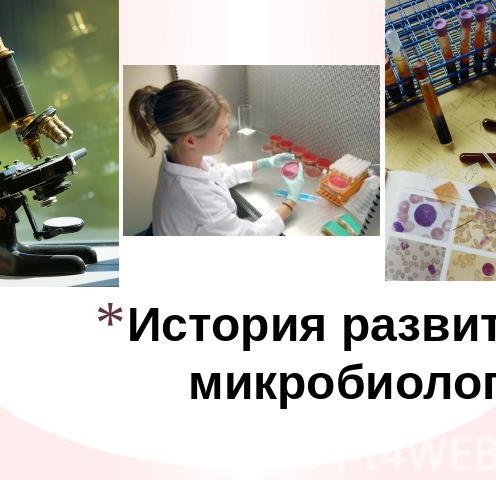Historical Stages Of Microbiology Development

Microbiology (from Greek mikros is small) as a science of microorganisms, their buoyancy and vitality, as well as changes that they have caused in human, animal, plant and non-living organisms, emerged in the second half of XIX. Its formation was closely linked to human practice, historical development, general progress in science (biology, physics, chemistry) and technology (discovery and improvement of microscopes and other research methods). In the process development of microbiology Differened to general, medical, agricultural, veterinary, sanitary, industrial, etc. Medical microbiology is of particular importance for the training of medical professionals. It's subdivided into bacteriology, virology, micology, immunology, protozoology.
In the history of microbiology, two main periods are empirical (up to the second half of XIX in.) and experimental, starting with the activities of L. Paster (see sect. 247).
EMPIARY PERIOD
The idea of the vibrant nature of the contagious beginning, which took thousands (and during the major epidemics and millions of pandemics) of human lives, has been shaped for thousands of years. Ibn Sina (980–1037) and other eminent thinkers of the past have made empirical guesses about the life of Tit Lucrezia Cara (95—55 M.E.), the Older (23—75 N.E.), Galen (oc. 131—c. 201 M.E.), Ibn Sina (980—1037).
Frequent epidemics of pervasive diseases in medieval Europe have contributed to the accumulation of information on ways of infection. The classical work of the Italian scholar of the Girolamo Fracastoro Renewal (1478-1553) " Contagion, Contagious Diseases and Treatment " (see 194).
The establishment of the first optical instruments at the beginning of the XVII inaugurated a new era in the history of microbiology. A. van Levenguk (see c. 228) was the first researcher to detect live micro-organisms and describe them in his work as “The Secrets of Nature Open by Antonia Levengouk” (1695). However, prior to the discovery of the first pathogenic micro-organisms and scientifically sound ones. ♪ ♪








